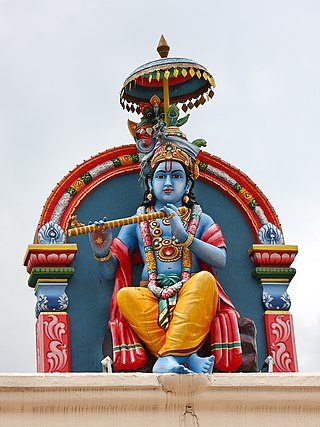
Krishna is a major deity in Hinduism. He is worshipped as the eighth avatar of Vishnu and also as the Supreme God in his own right. He is the god of protection, compassion, tenderness, and love; and is widely revered among Hindu divinities. Krishna's birthday is celebrated every year by Hindus on Krishna Janmashtami according to the lunisolar Hindu calendar, which falls in late August or early September of the Gregorian calendar.

Balarama is a Hindu god, and the elder brother of Krishna. He is particularly significant in the Jagannath tradition, as one of the triad deities. He is also known as Haladhara, Halayudha, Baladeva, Balabhadra, and Sankarshana.

Devaki is a character in Hindu literature, most noted for being the mother of the god Krishna. She is one of the seven daughters of Devapa or Devaka, a king of the Yadu dynasty, and has four brothers. She is one of the wives of Vasudeva. Her cousin is Kamsa, the king of Mathura, a cruel tyrant who had been told by Narada that he had been an asura killed by Vishnu in his previous life (Kalanemi), exacerbating his wickedness. According to popular tradition, Devaki is considered to be an incarnation of Aditi, a mother goddess who was the daughter of Daksha and the wife of Kashyapa.

Yashoda is the foster-mother of Krishna and the wife of Nanda. She is described in the Puranic texts of Hinduism as the wife of Nanda, the chieftain of Gokulam, and the sister of Rohini. According to the Bhagavata Purana, Krishna was born to Devaki, but Krishna's father, Vasudeva, brought the newborn Krishna to his cousin Nanda, and his wife, Yashoda, in Gokulam. This was for his upbringing, as well as to protect Krishna from Devaki's brother, Kamsa, the tyrannical king of Mathura.

Guruvayurappan also rendered as Guruvayoorappan, is a form of Vishnu worshipped mainly in Kerala, India. He is the presiding deity of the Guruvayur Temple, who is worshipped as Krishna in his child form, also known as Guruvayur Unnikkannan. The temple is located in the town of Guruvayur, Thrissur, Kerala, which is named after the deity.
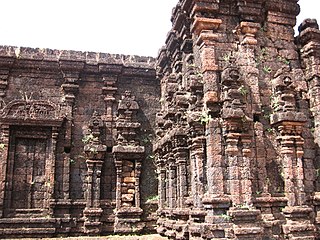
The Rajarajeshwara temple is a Shiva temple located in Taliparamba in Kannur district of Kerala State of India. The temple is regarded as one of the existing 108 ancient Shiva Temples of ancient Kerala. It also has a prominent place amongst the numerous Shiva temples in South India. It had the tallest shikhara amongst the temples of its time. The Rajarajeshwara temple has a top of about 90 tonnes. If any problem is encountered in the other temples of South India, devotees seek a solution in this temple through a prashnam, a traditional method of astrological decision-making. The prashnam is conducted on a peedha outside the temple.

Kamsa was the tyrant ruler of the Vrishni kingdom, with its capital at Mathura. He is variously described in Hindu literature as either a human or an asura; The Puranas describe him as an asura, while the Harivamśa describes him as an asura reborn in the body of a man. His royal house was called Bhoja; thus, another of his names was Bhojapati. He was the cousin of Devaki, the mother of the deity Krishna; Krishna ultimately fulfilled a prophecy by slaying Kamsa.
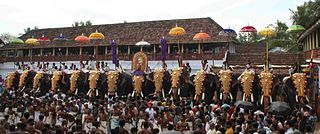
Sree Poornathrayesa temple is a Hindu temple situated in Tripunithura, Kochi, the capital of the former Kingdom of Cochin, Kerala, India. The temple is considered among the greatest temples in Kerala and was the first among eight royal temples of the erstwhile Kingdom of Cochin. The presiding deity is Vishnu as Santhanagopala Murthy or Poornathrayeesa. He was the national deity of Cochin and protector guardian of Tripunithura. Poornathrayeesa is known for his love of elephants. Hence more than 40 elephants participate in his Vrishchikotsavam.
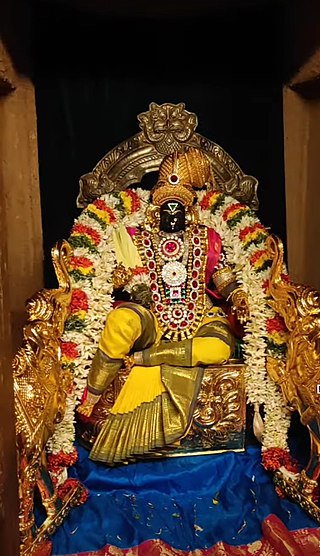
Bhumi, also known as Bhudevi, Dharani, and Vasundhara, is a significant goddess in Hinduism, personifying the Earth. Her earliest form is reflected in the Vedic goddess Prithvi, though their roles and depictions are drastically different.
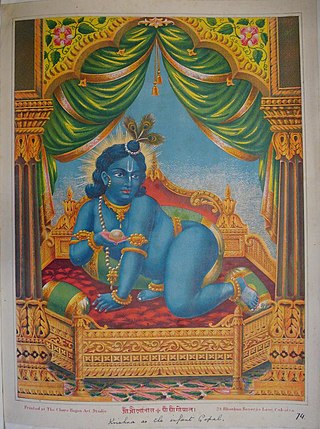
Bala Krishna or Bala Gopala, refers to the boyhood form of the Hindu deity Krishna. The worship of Krishna as a divine child was historically one of the early forms of worship in Krishnaism.

The Vilwadrinatha Temple is a Hindu temple in Thiruvilwamala, a town in the city of Thrissur, Kerala, India. The principal deities are Rama, the seventh incarnation of the god Vishnu, and his brother, Lakshmana. It figures among the Abhimana Kshetrams in Vaishnavite traditions. This is one of the four major Rama temples in Kerala — the other three are in Thriprayar, Kadavallur, and Thiruvangad. The temple houses an idol of Lakshmana, which is rare in India. Vilwadrinatha Temple is located in the centre of the community of Thiruvilwamala, atop a 100-foot-high hillock. Visible from the temple is Bharathappuzha, the second-largest river in Kerala, which flows past the temple's northern side from around 3 kilometres away.
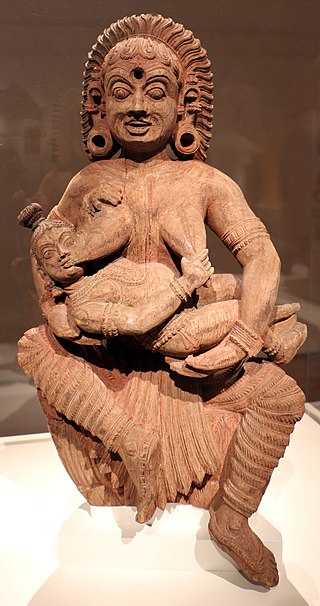
In Hinduism, Pūtanā is a rakshasi (demoness), who was killed by the infant-god Krishna. Putana disguises as a young, beautiful woman and tries to kill the god by breast-feeding poisoned milk; however Krishna sucks her milk as well as her life via her breasts. Putana is also considered as a foster-mother of Krishna as she breast-fed him. By offering her milk, Putana had performed "the supreme act of maternal devotion", in the shadow of her evil motives. The legend is told and retold in Hindu scriptures and some Indian books, which portray her variously as an evil hag or a demoness who surrendered herself to Krishna, though she initially came with evil motives.

The Sreevallabha Temple is an orthodox Hindu temple dedicated to Sreevallabha, a form of Vishnu. It is located in the city of Thiruvalla, India.
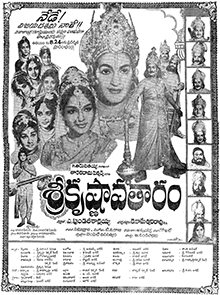
Sri Krishnavataram is a 1967 Telugu-language Hindu mythological film directed by Kamalakara Kameswara Rao. It stars N. T. Rama Rao, Devika and Kanchana, with music composed by T. V. Raju. The film was produced by A. Pundarikakshayya under the Taraka Rama Pictures. The film is based on the Hindu epics Mahabharata and Bhagavata Purana covering major life events of Lord Krishna.
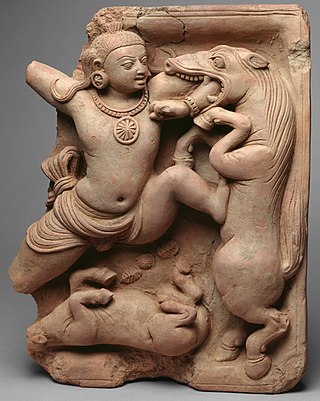
In Hindu mythology, Keshin, also called Keshi is a horse-demon, killed by Krishna, an Avatara of Vishnu. The demon was dispatched by Krishna's evil uncle Kamsa, who was destined to die at Krishna's hands.

Yogamaya is a Hindu goddess who serves as the personification of Vishnu's powers of illusion. In Vaishnava tradition, she is accorded the epithet Narayani, and is regarded as the benevolent aspect of the goddess Durga.
There are many stories that describe the origin of the word Thripunithura. Some latter day Sanskrit enthusiasts ascribe the origin of the name to "Poorna Veda Puri" - the town of Vedas in its entirety. Another possible origin to name comes from the meaning "the land on the shores of Poorna river".

The Tiruchanda Viruttam is a Tamil Hindu work of literature written by the poet-saint Tirumalisai Alvar, comprising 120 pasurams (hymns). It is a part of the Nalayira Divya Prabandham, the Sri Vaishnava canon of the Alvars. It is dedicated to the veneration of Vishnu, as well as his forms and incarnations, such as Krishna and Venkateshvara.

According to Hindu scriptures such as the Mahabharata, Harivamsa, and the Krishna Charitas, the birth of Krishna took place in Mathura, in present-day Uttar Pradesh, on the eighth day of the Krishna Paksha of the Bhadrapada month of the Hindu calendar, to Vasudeva Anakdundubhi, and his wife Devaki. According to Hindu mythology, Krishna was the eighth of the ten avatars of Vishnu, born in the Dvapara Yuga, the third age of the present Hindu cosmology. Krishna is revered as the Supreme Being in many Hindu traditions, most notably in the Krishnaism tradition of Vaishnavism.

















